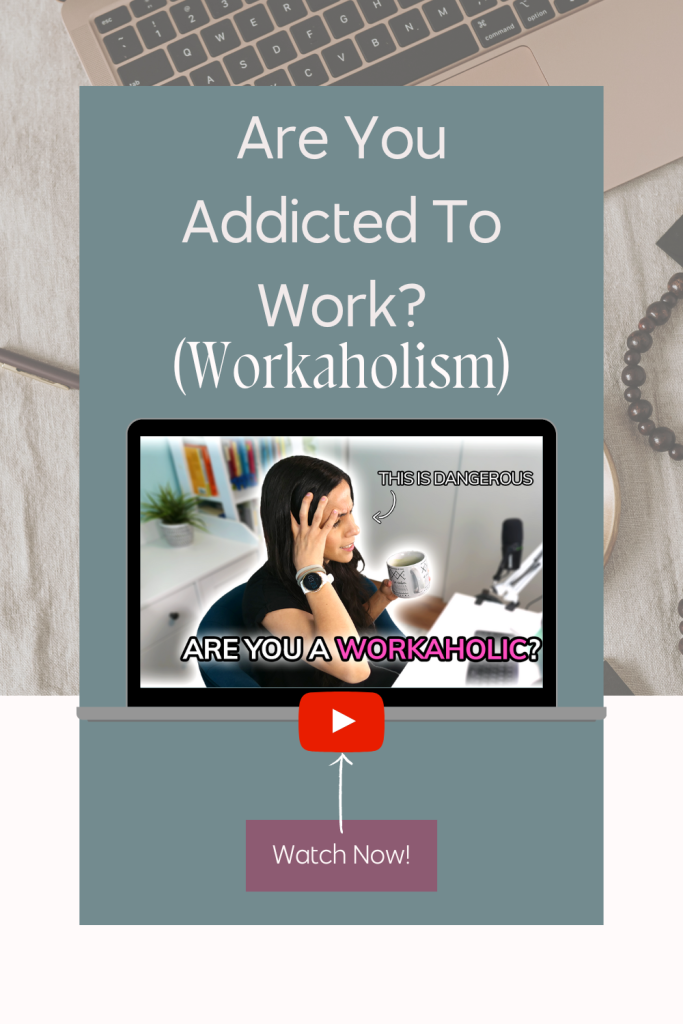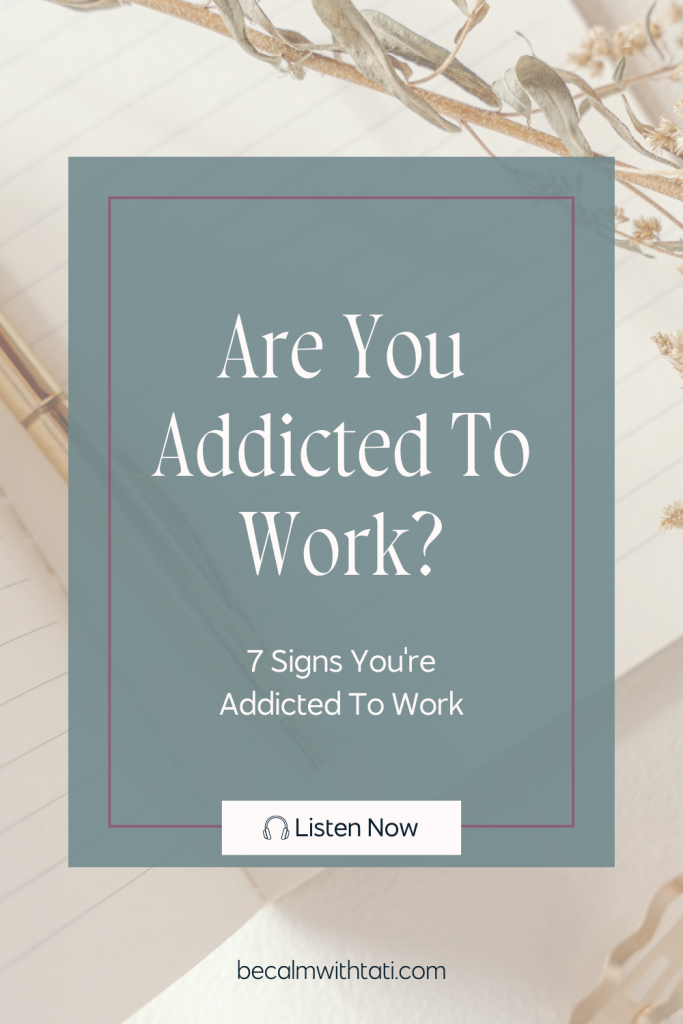Do you spend most of your time working? Is it hard for you to disconnect from work and do you feel a compulsive urge to work and get more done, even when you know you should be relaxing or spending time with loved ones? Workaholism affects about 1/3 of the working population and can have significant negative consequences on physical health, mental health, and relationships. In this episode, I’ll be sharing more about the psychology behind work addiction, signs you may be addicted to work, and therapist-backed tips to achieve a healthier work-life balance.
In this episode, you will learn:
- The psychology behind work addiction
- 7 signs you’re addicted to work
- 3 steps to achieve a healthier work-life balance
Mentioned in episode:
How To Separate Your Worth From Your Work: https://www.becalmwithtati.com/separate-your-worth-from-your-work/
https://www.youtube.com/live/41UM2LHjs9o?si=KNOSTtr-oJhz5ZjR
Work Addiction Resources:
https://workaholics-anonymous.org/
https://www.naatp.org/resources/addiction-industry-directory
Sources:
https://en.wikipedia.org/wiki/Workaholic
https://onlinelibrary.wiley.com/doi/abs/10.1111/j.1467-9450.2012.00947.x
https://clockify.me/workaholism-facts
https://www.ncbi.nlm.nih.gov/pmc/articles/PMC3835604/
https://www.healthline.com/health/addiction/work
++++++
Calmly Coping is a self-improvement podcast for high achievers who struggle with high-functioning anxiety to help you feel more calm, balanced, and confident from within.
++++++
WATCH THE FREE TRAINING: HOW TO CREATE WORK-LIFE BALANCE AND FEEL CALMER AS A HIGH-ACHIEVING PROFESSIONAL: https://calmlycoping.com/workshop
TAKE THE FREE HIGH-FUNCTIONING ANXIETY QUIZ: http://hfaquiz.com
INTRO/OUTRO MUSIC: Rescue Me (Instrumental) by Aussens@iter (c) copyright 2018 Licensed under a Creative Commons Attribution (3.0) license. http://dig.ccmixter.org/files/tobias_weber/57990 Ft: Copperhead
DISCLAIMER
All content here is for informational purposes only. This content does not replace the professional judgment of your own mental health provider. Please consult a licensed mental health professional for all individual questions and issues.
Episode Transcript
(Excuse grammatical errors because this is a direct transcript.)
Do you spend most of your time working? Is it hard for you to disconnect from work? And do you feel a compulsive urge to work and get more done even though you know, you should be relaxing or spending time with your loved ones? Workaholism affects about one third of the working population and can have negative impacts on your physical health, mental health, and relationships. In this episode, I’ll be sharing more about the psychology behind work addiction, signs that you might be addicted to work, along with therapist-backed tips for you to achieve a healthier work-life balance.
Let’s start with defining what it is to be addicted to work or to be a workaholic. I looked up the definition and it is a person who compulsively and compulsive means that you have an irresistible urge to work hard and long hours. It’s a person who works excessively and compulsively and is unable to detach from work. So, a workaholic experiences, an inability to limit the amount of time they spend on work despite negative consequences such as damage to their relationships or health. So, workaholism, or being addicted to work can be an example of what’s considered a behavioral addiction.
There are typically two types of addictions, there are behavioral and substance addictions. So addiction to substances includes addiction to any sort of substance such as alcohol or marijuana, caffeine, or anything like that. Whereas a behavioral addiction is just what it sounds like. It is an addiction to engaging in some sort of behavior. But what makes it an addiction is that there is an urge and a need to continue engaging in this behavior even though there are negative consequences as a result of engaging in that behavior. So some examples of behavioral addictions include gambling, internet addiction, sex addiction, social media addiction. So there can be many different types of behavioral addictions.
And when it comes to addictions to work many times, this is actually an addiction that is viewed as being respectful, something that is viewed as being a positive thing like, oh, I’m just a workaholic and people can often use that term as kind of a badge of honor being as something that is admired or looked upon positively and ultimately having an addiction to work is something that can be serious. And because it is something that is often admired and seen as something that is positive or to be strived for, then it can be hidden in plain sight. And many people may not be able to recognize the negative effects that can occur as a result of addiction to work. It can be one of those things that because people respect somebody who is a hard worker and can admire somebody who puts a lot of passion and perseverance towards something, then the negative side effects can often be overlooked or just seen as something that is a necessary means to an end.
So we’re going to talk more about addiction to work, what that can look like. And if you resonate with these signs, what you can do about it. And as an aside, if you’re a listener of my podcast, thank you for being here. Thanks for coming back. But I specialize in working with individuals of high functioning anxiety. And so those are individuals who appear high achieving and hard working on the outside, but on the inside are struggling with anxiety, overthinking, self doubt and people pleasing among other difficulties.
And what I have noticed, although there’s no research to support this, but this is just my personal and professional observation. I feel as though many individuals with high functioning anxiety can be in that place of struggling with addiction to work. And I think that’s because of the fact that these individuals tend to be high achieving and may have difficulty with relaxing and have the desire to constantly be productive or constantly be big and a fear of not doing so. And so these kind of create all of the circumstances that can result in this addiction to work. And so if you’re somebody who resonates with having high functioning anxiety, you might be able to relate to what’s in this episode as well. If you’re not sure if you have high functioning anxiety or not, I have a free quiz that you can take by going to hfaquiz.com. There will also be a link in the description.
So first, let’s talk about the signs that you are addicted to work or that you are a workaholic. So signs can include excessive time spent working even when you don’t have to, maybe you have difficulty disengaging from work and feel like you always need to be connected or always need to be aware of what’s going on or always need to be doing something related to work way beyond the call of the job or way beyond what your responsibilities are.
You may experience frustration, anxiety and or agitation when you’re prevented from working. Let’s say when you are with family or when you are on vacation or when you’re, you know, relaxing, watching TV, or spending time on your own on the weekend, you might feel this sense of anxiety or frustration that you aren’t working and this strong urge to work and to get things done. You may also lose sleep as a result of working. So this could be working late into the night, waking up early to work or, you know, sitting on your laptop and be staying up late working and interfering with the time where you should be resting and recharging. Or you might have difficulty sleeping, falling asleep or staying asleep because your mind is constantly on work and you’re constantly thinking about work and worrying about work. And it’s a lot of what’s on your mind and bothering you. You may also work to avoid personal life stressors. So let’s say if you’re going through relationship struggles, you’ve experienced against a significant crisis in your life or you’re going through financial struggles, you may work not just to obviously gain more finances and try to solve that problem, but ultimately, it’s not about the struggle, but it’s a form of avoiding thinking about and worrying about what is bothering you.
You might work as a way of avoiding difficult emotions like anxiety, stress or depression that are coming up for you. And you might also be obsessed or really fixated with work-related success. And as a result, you might have a strong fear of failure when it comes to work and feel as though you always need to be moving forward and you may feel like it’s never good enough and you always need to be achieving more and accomplishing more and ultimately, you are working at the expense of your health. And so this can include your physical health, your mental health and your relationships. So you might have, for example, no time for exercise, for taking the time to shop for and cook healthy meals. You might have no time to take time off because you’re constantly working or you might neglect things like date night or time with your Children or friends because you are constantly working and often times making excuses or reasons to work and feeling this strong urge. It’s not necessarily that you are choosing, ok, I am choosing to make an excuse to work because this is important to me. But it oftentimes feels like a necessity and something that you have to do.
So there is also something called the Bergen Work addiction scale and this was developed in 2012 in Bergen Norway. And so this talks about signs that essentially you may be struggling with work addiction. So I’m gonna go through some of the signs on the rating scale, but basically, the way it works is you identify with each of these signs anywhere from 1 to 5. So one is that you never experience this two is rarely three, is sometimes four, is often and five is always so on that scale from 1 to 5. How often would you say that you are this or how often is this something that is coming up for you?
So the first is you think of how you can free up more time to work on that scale of 1 to 5. Next is you work in order to reduce guilt, helplessness, depression and anxiety. Next, you’ve been told to reduce your time working but ignore those requests. Next is you spend much more time working than you initially intend. You become stressed when you are not able to work, you lower the importance of hobbies, fun activities and fitness in exchange for more work time and you work so much that it has negatively impacted your health. So the research related to this scale indicates that if you answered often or always to at least four of these items, then you may have a work addiction. Of course, this does not replace the guidance of a mental health professional. And I’m going to talk more about those resources at the end of this episode. But this can just be a tool for you to assess where you currently are. And if this is something that is you’re really struggling with that, you may need to get more support and guidance for additionally, people who are workaholics tend to have an inability with or struggle with delegating work tasks to others.
And studies also demonstrate that they tend to obtain high scores on personality traits such as neuroticism, perfectionism, and conscientiousness. Just some things to be aware of when it comes to the research related to work addiction. And I talked before about the consequences of being a workaholic or being addicted to work. Ultimately, it is the act of working at the expense of your well being. The research shows that some of these negative consequences include burnout. And that’s a point where you have an inability to or strong difficulty to continue to work. Maybe you’re starting to feel resentment or cynicism towards your job. Maybe you’re struggling with recharging and feeling like you ever have you all to give when it comes to work. Other problems include sleep problems and exhaustion, weight gain, high blood pressure, anxiety, and depression and physical pain. So this is just as a result of some of the research that has been done. If this is something that you resonate with and you kind of checked off these boxes as I was going through, then I want you to know that you’re definitely not alone and awareness is the first step to making changes.
So maybe now you’ve recognized, ok, maybe I am addicted to work and I didn’t even realize it before. And so now what can I do about it? So now let’s talk about some tips to help you achieve a healthier work life balance. So you can address this work addiction. So first before I get into that, I want to talk about my free training. So I I have a free training available if you’re interested on how to create work life balance and feel calmer as a high achieving professional in this training, I share my three phase process to help you feel calm, balanced and confident from within and stop overworking. You can learn all about that by going to calmlycoping.com/workshop or click on the link in the description. OK.
So now getting back to work addiction specifically, I have three different categories of things that I identified to help you to address this work addiction. So step one is to explore. So this is all about looking at and exploring essentially your behaviors, your tendencies, getting to understand more about where you currently are. So step one can be to acknowledge the problem. They say that the first step to overcoming addiction is just acknowledging that you have a problem in the first place and that is the case with this. So that can include just acknowledging that. “Ok, yeah, maybe I am addicted to work.” And then the next step after that is looking at, OK, how is this addiction to work negatively impacting your life? How is it potentially negatively impacting those around you? So your health, your mental health, your relationships, it can be helpful to write this down so that you can bring to awareness the consequences of your actions. Many times there can be strong urges to continue working.
And until you bring to light what the consequences are of these actions, then it’s going to be more difficult to get out of that place. So just even if you want to listen back to this episode and reflect upon what you resonate with and write those things down, that can be a helpful way to explore that. Next. I want you to explore what are potential causes. So, is it that you are avoiding problems in your life and that is resulting in you wanting to continue working? Is it something that you have learned? Maybe you saw your parents were workaholics and you know, constantly working hard. And you see that as something that is just something that you’re supposed to do. Maybe it’s something that you are see as something that’s admired. So looking at maybe this is something that you have learned from others. Maybe you are struggling with your mental health, struggling with anxiety or depression or something else that might be resulting in you continuing to work. So exploring what might be the causes and again, so these are the underlying causes that are preexisting that are creating this cycle of overworking.
And then the next step that you might want to explore is what are the triggers for your urges to work. So these are specific things that you are either experiencing internally or externally that are resulting in this urge, this need and this strong desire to work. So I mentioned before, it could be a result of avoiding strong emotions. And so maybe when you feel anxious or when you feel bored even, or when you feel overwhelmed. You may notice that there’s strong urges to work. So bringing awareness throughout your day. So is it that when you’re feeling stressed or overwhelmed, is it maybe that you don’t have plans for other things to do or you don’t have alternatives for ways to spend your time? So then you find that you’re filling up your time with work as a result, is it that you are experiencing feelings of loneliness and work gives you the sense of a purpose or something to work towards. And so you are choosing to spend your time working as a result of that.
So this can be exploring what are these specific triggers that then result in you engaging in the actions of overworking. And another thing for you to explore is many times we can attach self-worth to our work or how productive we are. And if this is something that is interesting to you and that you want to look into further, I actually have an entire episode on this topic on how to separate your worth from your work. I’ll leave a link to that in the description after you explore. Next step is to make changes. So this is all about making changes to your behaviors and to the way that you engage when it comes to your work. So one way you can do that is to begin setting boundaries. And so this can look like setting your work hours clarifying. When do you want to start work, do you want to finish work and actually sticking to them many times, there can be, you know, this tendency to work long through, let’s say, working through your lunch or continuing to work into late hours of the night. And so maybe you want to set working hours and say, ok, I’m going to work from 9 to 12, take a lunch break and then I’m going to work from 12 30 or 1 to 5 and really being specific with those working hours so that you are not just continuing to work through and not take time to recharge and for yourself.
And also it can be helpful to communicate these boundaries to others so that you’re setting clear expectations, so communicate them not only to yourself by maybe like marking them down in your calendar, but communicating to your supervisor, to your colleagues, to your clients or anybody else who would benefit from knowing when they can expect to see you working, when they can expect to hear back from you when it comes to communication within the workplace.
Another change that you can make is to make sure that you are unplugging regularly. So this can look like disconnecting from work-related devices if you have a work cell phone or if you have work email or anything that is keeping you connected to work, taking those steps to disconnect from these devices from these forms of communication. And so this can allow you to not just physically disconnect when you’re done working also mentally, but then also allow you to have that separation when it comes to the time that you relaxing on the couch at night. So that you’re not necessarily responding to work emails, but you are allowing yourself to disconnect, maybe turning off work notifications during that time or taking work email off of your phone completely and then addressing it when you return to work. And if you notice that there’s a lot of anxiety or resistance that comes up when you do this, that’s something that’s worth exploring and addressing and realizing that, ok, maybe it’s this strong feeling and this fear or worry of what if I miss something or what if I’m seen as dropping the ball that might be encouraging, this continued urge to work once you start to make these habit and behavior changes that can actually bring to light some of the triggers for these unhealthy behaviors.
Another thing that can be helpful is to delegate more or ask for help. So I mentioned earlier that the research demonstrates that people who are addicted to work tend to have difficulty with delegating. And so if you can learn, even if it’s little by little how to delegate tasks and let go of that control. And even if it’s asking for help, if you feel as though you cannot get all of your work done in the time that is allotted and that’s why you feel as though you have to work more hours than letting your supervisor know, letting your team know whoever it is that could benefit from having that information and either giving you alternatives or giving that work to somebody else so that they can help you with that workload.
And also another thing that can help is learning how to say no to opportunities. So it can be really challenging to say no when you are somebody who is in this place of feeling addicted to work, because you feel as though you want to continue to do more, achieve more and you don’t want to miss out on any opportunities. And there can be this fear of failure that is underlying that urge to continue to say yes. But at the end of the day, when you continue to say yes to more, you are just loading more onto your plate and giving yourself more reasons to continue working and to not take time for yourself.
And another thing that can be super helpful and super necessary is to intentionally schedule time for self-care. So I mentioned before scheduling out your lunch hour, even if you just start with that something as simple as that and actually taking the time to eat your lunch away from your desk, maybe whether it’s in a cafeteria somewhere or whether it is on a bench in a park or whatever works for you. But having even just that physical separation for that small amount of time in the middle of your work day, taking those small baby steps, little by little can make a big difference in the long run when it comes to setting healthier boundaries and practicing the care that you need for yourself. And it could be also setting aside time daily for activities that you enjoy and that bring you joy and fulfillment outside of work. So this can include things like reading, exercising, pursuing a hobby, or spending time with loved ones, just ensuring that once a day doing something for yourself that is completely outside of and separate from work.
And so this can include even, let’s say if you enjoy reading, but you’re reading things that are related to your work that can put you into that mindset of thinking about work even more. So even thinking of, can you read a book that is completely separate from your work, from your responsibilities, and just something that is just for you that was steps one and step two, and then step three is to get support.
So this can look like seeking out therapy from a mental health professional in your area. If you’re located in New Jersey, I’m a licensed professional counselor in New Jersey and can help to support you and walk you through that. You can also seek out resources such as workaholics anonymous, and seek out addiction treatment providers. I’m going to leave links for both of those resources in the description, you can also seek out the support from a coach depending on what your current struggles are. I also provide work-life balance and executive coaching for high-achieving professionals.
Another way that you can seek out support is by speaking to your close family members, friends, and colleagues about what you’re going through. Sometimes just getting this out and seeking support from those that are close to you. Even if it’s just somebody to listen to you and to hear out what you’re going through can make a big difference in the long run.
So if you are in the place of struggling with addiction to work, you’re not alone. And there are steps that you can take. I’d love to hear your thoughts on this topic. If you’re watching this on YouTube, leave me a comment below and let me know what steps will you take to address your work addiction? And if you have questions about this episode, feel free to reach out to me directly, you can send me an email at [email protected]. And while you wait for next week’s episode, I have other episodes about calming your mind, creating work-life balance, and feeling more confident from within. Thank you so much for tuning in today and until next time, be calm.















